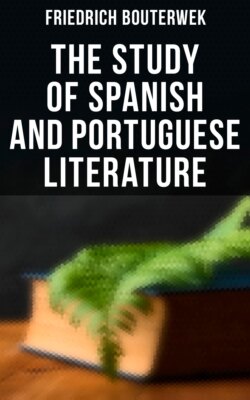Читать книгу The Study of Spanish and Portuguese Literature - Friedrich Bouterwek - Страница 20
На сайте Литреса книга снята с продажи.
POETICAL COURT OF JOHN II.
ОглавлениеTable of Contents
The Spanish authors make the reign of John II. the commencement of an epoch in their poetry. But though some poetic essays of greater compass than had previously been undertaken, were then produced, still this period ought really to be regarded only as that in which the ancient poetry received its last improvement, and by no means as constituting a new era. The old national muse of Castile continued the favourite of many of the grandees of the kingdom who were ambitious, in imitation of Alphonso X. of uniting the reputation of learning to the fame of their poetry, but who had more true poetic feeling than that monarch. These noble authors thought they could acquire little honour by devoting their attention to the composition of romances, properly so called, but preferred distinguishing themselves by giving to lyric poetry a higher degree of art in its forms, and more ingenuity of invention. As a consequence of this taste, they displayed a particular fondness for allegory, and ingenious difficulties and subtilties of every kind were the great objects of their labours. Their best works are some compositions in which they seem unconsciously to have allowed nature to speak, and these specimens possess about the same value as the anonymous romances. They brought the dactylic stanzas (versos de arte mayor,) again into vogue, because such artificial strophes had a more learned air than the easy flowing redondillas. Mythological illusions and moral sentences were, with these authors, the usual substitutes for true poetic dignity. But barbarous as was their taste, nature, which they wished to renounce, sometimes worked so powerfully within them, that she triumphed over the pedantic refinement to which they had surrendered their understandings;—and the graceful facility of the popular manner occasionally appeared in their writings. In this way the ancient national poetry became amalgamated with works distinguished for laborious efforts of art, and ultimately attained a higher degree of consideration. There resulted, however, no revolution in the literature of Spain; and it cannot be said, that the authors of the age of John II. formed an epoch, unless it be for having introduced, with more success than Alphonso X. learning and philosophy into the sphere of poetry; and for having, besides, by their united endeavours, given to the ancient lyric forms of their maternal language, that sort of improvement which, consistently with the spirit of the age, they were capable of receiving, and which finally brought them to their highest state of perfection.
But this period of brilliant improvement in the ancient national poetry of Spain is, in another respect, more memorable than the writers on Spanish literature appear to have regarded it. During the whole period the Castilian monarchy was convulsed by internal troubles. Even in the last ten years of the fourteenth century, the powerful barons of the kingdom had almost wrested the sceptre from the hands of John I. and Henry III. Under John II. the celebrated patron of poetry, who reigned from 1407 to 1454, the monarchy was more than once menaced with destruction. The grandees sported with the royal prerogatives, and John II. had not sufficient firmness of character to render his authority respected. In the difficult situations in which he was involved, he derived, in a certain measure, his security from his love of literature, which yielded a valuable return for the favours he had bestowed. It won and preserved for him the attachment of many of the most considerable noblemen of the country, who formed around him a poetical court, which was not without influence on public affairs. It would not be easy to find in the history of states and of literature, another instance of a similar court, with the members composing it, at once poets, warriors, and statesmen, surrounding and supporting a learned sovereign, in spite of his imbecility, during a period of civil commotion. This phenomenon proves the supremacy of the poetic spirit at this time in Spain, since it was not to be subdued even by the spirit of political faction, which is always hostile to poetry, and which was, at this time, particularly powerful.
